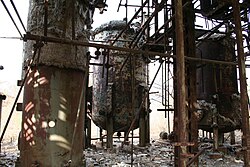Union Carbide not liable in Bhopal gas leak cleanup, says US court
By PRASENJIT BHATTACHARYA
NEW DELHI -- A New York federal court has dismissed all claims by Indian plaintiffs against Union Carbide Corp. for any environmental fallout of a gas leak which killed thousands of people in the Indian city of Bhopal 28 years ago.
Giving his reasons for the order, the judge said that "it is beyond dispute that Union Carbide India" - and not the US-based parent - "generated and disposed of the waste which allegedly polluted plaintiffs' drinking water."
The court added that since Union Carbide sold its stake in the India unit, it's not liable for the clean-up.
Union Carbide Corp. sold its holding in the unit involved in the leak - Union Carbide India Ltd. - in 1994. The unit was then renamed Eveready Industries India Ltd.
Rachana Dhingra, an activist associated with the Bhopal Group for Information and Action, which has spearheaded the case in US courts, expressed disappointment at the dismissal of the case, but added that they are determined to appeal.
"We will talk to our lawyer in the US soon and decide on when to file the appeal in the US Court of Appeals."
 The present case, one of many filed in India and the US since 1984, had asked Union Carbide Corporation, now a part of Dow Chemical, to pay damages to residents for not cleaning up the site of its factory in Bhopal.
The present case, one of many filed in India and the US since 1984, had asked Union Carbide Corporation, now a part of Dow Chemical, to pay damages to residents for not cleaning up the site of its factory in Bhopal.
The pollution caused by the gas leak led to toxic chemicals poisoning drinking water in the area, plaintiffs said while filing the case in 2004.
A Manhattan district court struck down the claims, but an appeals court sent the case back for another hearing in 2008.
The Bhopal incident - one of the world's worst industrial disasters - occurred on the night of Dec. 3, 1984, when leakage of methyl isocyanate at a Union Carbide pesticide factory killed thousands and left many others to battle illnesses for years.
There's still no agreement on the number of people who died on the night of the disaster or those who subsequently battled lung injury, neurological and reproductive disorders and respiratory difficulties - or died years later as a result of health complications.
India's federal government says 5,295 people died and 4,902 suffered permanent disability as a fallout of the disaster, but activists insist the actual figures are much higher.
The first major judgment in the Bhopal issue came in 1989 when India's Supreme Court asked Union Carbide to pay $470 million in damages to the victims.
The court has upheld the decision despite appeals by victims' organizations for a higher payout.
However, the site cleanup issue has dragged on, with governments in New Delhi and Madhya Pradesh - the state of which Bhopal is the capital - unsure of how to get rid of the toxic waste.
Earlier this month, a group of federal ministers approved a plan to disposal of the waste in Germany.
Activists in Bhopal and human rights groups around the world have kept the issue of the tragedy alive, saying Dow Chemical has failed to fulfill its moral obligations of paying adequate compensation and cleaning up the site of the disaster.
But Dow Chemical has on several occasions said it bought Union Carbide 16 years after the tragedy - and so it can't be held liable.
It has also said that since Union Carbide paid the $470 million damages in 1989, it's not responsible for any further payments.
The Bhopal gas tragedy movement gathered new momentum when Dow was announced as a key sponsor of the summer Olympics which begins in London next month.
Protests have sought to embarrass the British government and Dow Chemical, but both have stood by the sponsorship deal.
The Indian Olympic team, too, is expected to participate in the games despite some talk earlier of a possible boycott.
Dow Jones Newswires






Comments